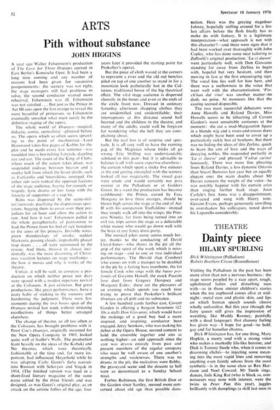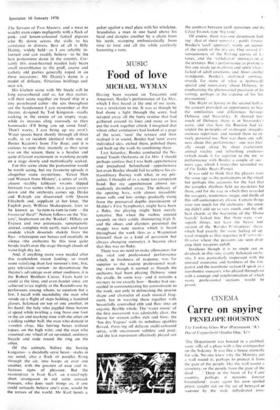THEATRE
Dainty piece
HILARY SPURLING
Dick Whittington (Palladium) Robert Brothers Circus (Roundhouse)
Visiting the Palladium in the past has been more often than not a nervous business: the stage seems peopled by a race apart, tough, upholstered ladies and disturbing men with—as in those sinister children's stories when the toy cupboard comes alive at mid- night—metal eyes and plastic skin, and lips on which human speech sounds almost wholly unfamiliar. But this year (though the fairy queen still gives the impression of wrestling, like Maddy Rooney, painfully with a dead language), that clammy feeling has given way—I hope for good—to bold, gay and far homelier charms.
Dick Whittington has, for one thing, Mary Hopkin, a merry soul with a strong voice who makes a markedly life-like heroine; and Dick is Tommy Steele who, when it comes to disarming clichés—to injecting some mean- ing into the most vapid lines and removing anything even faintly odious from the most synthetic—is in the same class as Rex Har- rison and Noel Coward. Mr Steele sings, dances, foils King Rat (who is black as, con- noisseurs may note with interest, were the twins in Peter Pan this year), juggles brilliantly with dumplings (a skill last seen in
The Servant of Two Masters, and a treat to watch), even copes negligently with a flock of pink- and lemon-coloured fantail pigeons who fly down across the stalls to his assistance in distress. Best of all is Billy Dainty, widely held—as I am reliably in- formed and can readily believe—to be the best pantomime dame in the country. Cer- tainly this stout-hearted maiden lady bears small resemblance to the gruff, coarse and rackety old parties generally roped in on these occasions: Mr Dainty's dame is a model of delicate, flirtatious bridlings and neat wit.
His kitchen scene with Mr Steele will be long remembered and so, for that matter, will their scene together on board ship in a tiny pasteboard cabin--the sets throughout are the handsomest I can remember at this theatre, designed by Tod Kingman—madly rocking in the centre of an empty stage, while its inmates cling morosely to their hammocks (I'll bring you up some food', 'Don't worry, I can bring up my own'). Water spouts burst shortly through all three walls, in an incident identical with one of Buster Keaton's from The Boat; and it is curious to note that, masterly as that scene was on the screen, there is a headier and quite different excitement in watching people on a stage slowly and methodically soaked.
For this scene alone the pantomime would be worth seeing, but my favourite episode is altogether more mysterious: 'Great Men and Women from History', a series of swift, almost stealthy tableaux vivants slipped between two scenes when, as a gauze comes down and the orchestra comes up, Drake and Raleigh are discovered with Queen Elizabeth and, suppliant at her knee, 'the English poet. William Shakespeare. later to be known as `ta-rum-ta-rum-ta-rum — the Immortal Bard!' Nelson follows on the 'Vic- tory', Stephenson on the 'Rocket'. Hillary on Everest and two astronauts, sumptuously attired, complete with earth, stars and lunar module which descends shakily from the flies--whereupon our heroes toil manfully in silence (the orchestra by this time quite beside itself) over the stage through clouds of waist-high dry ice.
And, if anything more were needed after this resplendent moon landing--- so much more satisfying than last summer's tiny, live, grey television version—to demonstrate the theatre's advantage over other mediums, it is the Robert Brothers Circus. Feats hard to credit at the time, and even harder since, are achieved twice nightly at the Roundhouse by performers among whom, to mention but a few, I recall with incredulity the man who strode up a flight of steps holding a hundred glasses, balanced on top of one another, in his hand; the lady who juggled three batons at speed while twirling a ring from one foot in the air and marking time with the other on a rolling rubber ball; the man who danced in wooden clogs, like herring boxes without topses, on the high wire; and the man who mounted one wheel of an up-ended, ordinary bicycle , and rode round the ring on the other.
Of the animals, Sidney the boxing kangaroo—a decidedly eerie beast—sticks in my mind; also a flock of poodles flying through the air, into hoops or over one another, with the greatest of ease and in- fectious signs of pleasure. But the masterpiece is Ivan Karl. an exceed;ngly short strongman in red satin cossack trousers, who does such things as. if one could seriously believe one's eyes, would be the terrors of the world. Mr Karl bends a poker against a steel plate with his windpipe, brandishes a man in one hand above his head and dangles another by a chain from his teeth, stamping enthusiastically from time to time and all the while carelessly humming a tune.



































 Previous page
Previous page